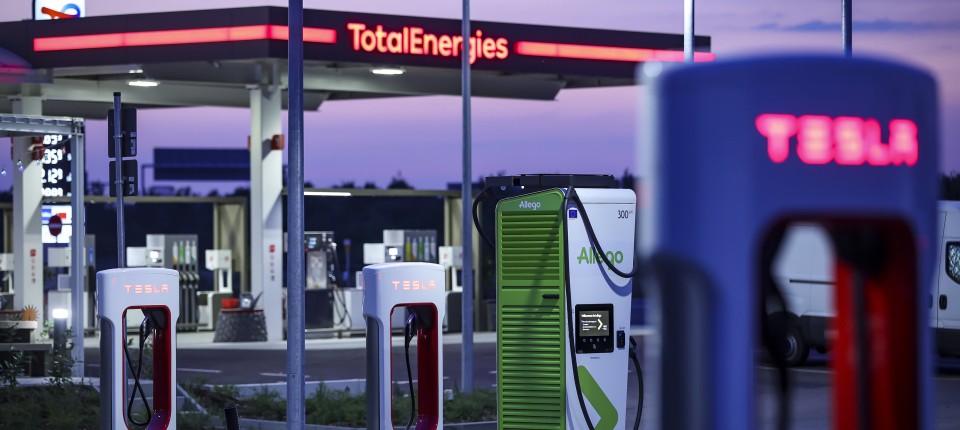
GERMANY. Why the expansion of charging stations at service stations is delayed
Charging stations from Tesla and Allego are located next to a TotalEnergies SE filling station in Schkeuditz, Saxony.
Charging stations from Tesla and Allego are located next to a TotalEnergies SE filling station in Schkeuditz, Saxony. Picture: dpa
Tank & Rast was tasked with building charging stations for electric cars. But Tesla and Fastned want to build charging parks on the highway themselves. A lawsuit delays everything.
DThe expansion of the charging infrastructure for electric cars in Germany is stalled by legal disputes. The majority of motorway service areas are affected, which are mainly operated by the concessionaire Tank & Rast. About two years ago, the company received an order to equip its service areas with fast-charging stations. The American car manufacturer Tesla and the grid operator Fastned had filed a lawsuit against this, which is currently being dealt with by the European Court of Justice (ECJ).
The chances that the competitors will win this legal battle are apparently not bad. According to information from the F.A.Z., according to a report by the Research Service of the EU Commission, there are doubts about the legality of the agreements concluded with Tank & Rast. For this reason, the state-owned Autobahn GmbH has decided not to continue implementing the agreement with Tank & Rast from 2022 for the time being. They are now waiting until a legal decision has been made, according to circles of Autobahn GmbH. So far, there are 710 charging points with more than 150 kW of power, 2500 are planned.
With this decision, the motorway company is playing it safe. If the supplementary agreement with Tank & Rast proves to be invalid, the costs could be significant. The reversal could take a long time. The ECJ had already pulled the plug on a major transport policy project once: The car toll of former Federal Transport Minister Andreas Scheuer (CSU) failed there in 2019 and led to his successor Volker Wissing (FDP) having to pay 240 million euros in damages to the operating companies.
ECJ is expected to deliver its ruling in autumn 2024
The legal doubts also mean that, for the time being, no charging stations for e-cars will be built, especially at central locations in the country. It is currently expected that the ECJ could deliver its ruling in autumn 2024. Then the Higher Regional Court of Düsseldorf has to decide on the merits of the case. This is expected in spring 2025. The German judges are in charge of the proceedings of Tesla and Fastned. In June 2023, they had submitted some questions to the CJEU for a decision. The Luxembourg judges are currently in the process of obtaining opinions in the proceedings.
The case is complex because the contract was concluded as a supplement to contracts dating back to the privatisation of the service areas in 1998 and also involving complicated European procurement rules. This is based on concession agreements concluded by the Federal Ministry of Transport with the “Society for Ancillary Operations of the Federal Motorways”. This state-owned company was privatized in 1998 and has been called Tank & Rast ever since. It operates more than 90 percent of all motorway service stations in Germany. The orders were placed on the basis of the Fast Charging Act. It dates back to the time of the former black-red federal government. Whether the award of the contract without a formal procedure was legally permissible must now be clarified by legal action. The aim was actually to realise a “sufficient number of charging points along the federal motorway” by 2025.
Doubts about the legal situation in the dispute over charging stations at motorway service stations are apparently also caused by experiences in recent years about the presence of oil companies at motorway petrol stations. This was originally set at motorway petrol stations without a call for tenders, simply according to the market shares of the petrol station brands in Germany. Following complaints and interventions by the Federal Cartel Office, among others, at least some of these supply rights have now had to be auctioned off in a Europe-wide tender since 2018. For the period from 2023 to 2028, this principle applies to 41 per cent of motorway petrol stations, while 49 per cent of petrol stations were allocated according to market share in Germany and 10 per cent of petrol stations are leased directly to oil companies. After this experience in the petrol station business, it seems doubtful that the possibilities for the construction of charging stations will now be awarded without a tender, as was the case in previous years with the supply of motorway petrol stations.
The concessionaire Tank & Rast says it is interested in “continuing to consistently push ahead with the expansion of the fast-charging network along the motorways”. For the company, which has recently reported losses, this would be an opportunity to increase the number of visitors to the service areas. Competitors, such as the truck stops, are bothered by the fact that land for the charging stations has to be acquired elsewhere, while – according to the federal government – Tank und Rast was provided with land from the federal government at 325 service stations by 2022. This is a thorn in the side of the left-wing member of the Bundestag Victor Perli, who has been following the issue for years: “My inquiry has brought to light that the federal government has given Tank & Rast the parking spaces for charging stations virtually free of charge. It’s no surprise that competitors are resisting the preference for Tank & Rast. The federal government must finally stop coddling Tank & Rast.”